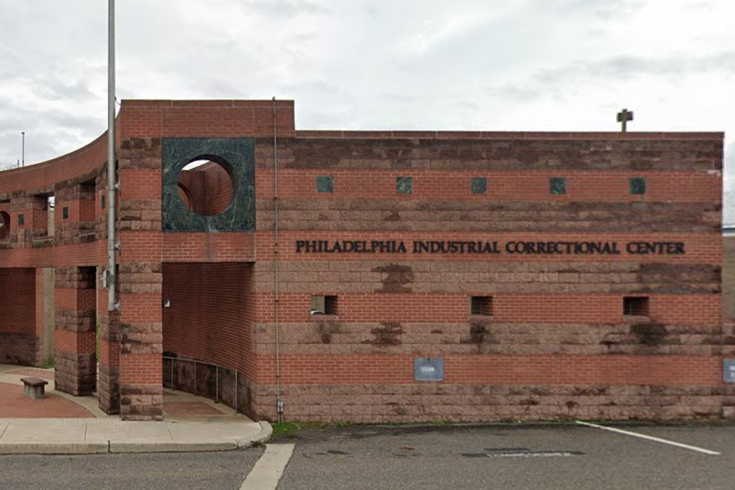
May 03, 2023
 Street View/Google Maps
Street View/Google Maps
AFSCME Local 159, a union representing Philadelphia's correctional officers, voted 'no confidence' in Prisons Commissioner Blanche Carney over unsafe, inadequate conditions and staffing issues at the city's four prisons. Pictured above is the Philadelphia Industrial Correctional Center on State Road in Holmesburg.
Members of Philadelphia's correctional officers' union were unanimous in their vote of "no confidence" in Prisons Commissioner Blanche Carney late on Tuesday, union officials confirmed Wednesday morning.
AFSCME Local 159, which represents correctional officers at Philly prisons, claimed that Carney's failure to address an ongoing staffing crisis and provide substantial support to improve the health and safety conditions of the four prisons under her jurisdiction, which union members have described as "deplorable," led to the vote.
The vote is symbolic and does not require any action on the part of the Department of Prisons. But David Robinson, president of the union, is calling for Mayor Jim Kenney, who appointed Carney in 2016, to remove her from the position and name an acting prisons commissioner. Robinson has also called on the remaining mayoral candidates to commit to addressing leadership issues at the Department of Prisons and removing Carney if she is still in office at the end of Kenney's term.
"Enough is enough. Throughout Commissioner Carney's seven-year tenure, the conditions of, and safety within, our city's prisons have dramatically deteriorated," Robinson said. "That is not an accident; it is a failure of leadership. Meanwhile, our members — the corrections officers that work tirelessly to keep our prisons healthy, safe, and secure — have been continuously disrespected by the Commissioner's failure to address the poor living conditions that our officers endure, and the poor living conditions that incarcerated Philadelphians experience."
Union officials noted in a press release that, by the end of 2022, there were 805 staff vacancies at the Department of Prisons, representing 42% of all budgeted positions. An independent monitor assigned to oversee Philly's prisons explained that the city's efforts are not "aggressive" enough to solve the staffing crisis and improve conditions for more than 1,000 sworn correctional officers and 4,300 people incarcerated in the city's four prisons.
In 2022, 10 inmates died while locked up in Philadelphia prisons. At the height of the COVID-19 pandemic, at least 29 people died — a rate that's 77% higher than the national average, according to the union. Workers believe that the staffing crisis has led to the deterioration of health and safety conditions at the prisons.
In September 2021, a video leaked of an inmate at the Curran-Fromhold Correctional Facility in Northeast Philly being stabbed multiple times without a guard in sight before crawling back into his cell. Corrections officers described the incident as a consequence of keeping inmates locked in their cells for 21 hours a day, the Inquirer reported.
Union officials said that the prisons are "historically unclear and unsanitary," with a lack of emergency, routine maintenance in place. Older jail facilities are not being cleaned frequently, they argue. Some prison units are also not providing enough out-of-cell time for prisoners, which can have damaging impacts on mental and physical health and contribute to recidivism.
Union officials also say that Carney has refused to attend labor-management meetings and has been unwilling to assign deputies to attend the meetings on her behalf, which workers believe has led to the prisons commissioner ignoring staff needs and prison operations.
"The union has diligently tried to work with the Commissioner to implement necessary reforms, but she refuses to meet with us," Robinson said. "Our needs have been ignored for far too long, we are now taking a pivotal step to tell everyone in this great city that her poor leadership is unacceptable."
Carney did not immediately respond to PhillyVoice's requests for comment regarding the "no confidence" vote. A spokesperson for Kenney's office said that the administration and Carney have been have been working to address the staffing and facilities challenges mentioned by corrections officers.
"The Mayor's proposed budget includes millions of dollars in capital funds to address facility needs, and the Department is already implementing several staffing solutions including a 12-hour shift initiative, attendance incentives, and a significant recruitment campaign," the spokesperson said. "We appreciate the concerns raised by staff and continue to work with Commissioner Carney, who has the administration's support and confidence, on our shared goal of ensuring good working conditions as well as safe, clean, humane environments for incarcerated people."
During a budget hearing last month, Carney sent City Council a prepared testimony about her department's achievements and goals for the next fiscal year. The Department of Prisons is looking to hire a diversity coordinator in order to enhance workforce development, hire a wellness coordinator to provide staff with resources on work-life balance and continue a hiring campaign to fill vacancies.
Union officials believe that Carney has failed to take steps to fulfill obligations stipulated by a federal class action lawsuit settlement, though a city spokesperson said that Kenney's administration is committed to achieving full compliance and reporting progress. The suit, filed by 10 incarcerated Philadelphians, argued that the city's jails did not comply with rules requiring that prisoners receive a minimum of three hours outside of their cell each day.
The lawsuit further claimed that prisoners were being denied time to shower, make phone calls and get exercise. Prisoners said that they were not given access to hand soap and sanitizer and that shared items like phones were not cleaned frequently enough to contain the spread of the COVID-19 virus.
In addition to a $125,000 settlement reached in mid-2021, the Department of Prisons pledged to hire the independent monitor last spring to oversee efforts to address an influx of violence, prolonged lockdowns and staffing shortages at the prisons.